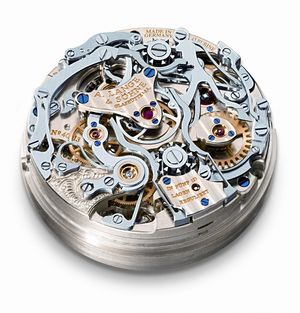Movement: Unterschied zwischen den Versionen
Zur Navigation springen
Zur Suche springen

| Zeile 1: | Zeile 1: | ||
'''Movement''' | '''Movement''' | ||
| − | {{other languages|[[Uhrwerk|de]]}} | + | {{other languages|[[Uhrwerk|de]]|[[Часовой механизм|ru]]}} |
[[Bild:A_Lange_und_S%C3%B6hne_Kaliber_L903.0_Tourbograph_Pour_le_Merite.jpg|thumb|movement [[Lange L903.0|calibre L903.0]]]] | [[Bild:A_Lange_und_S%C3%B6hne_Kaliber_L903.0_Tourbograph_Pour_le_Merite.jpg|thumb|movement [[Lange L903.0|calibre L903.0]]]] | ||
A movement in watchmaking is the mechanism that measures the passage of time and displays the current time (and possibly other information including date, month and day). Movements may be entirely mechanical, entirely electronic (potentially with no moving parts), or a blend of the two. Most watches intended mainly for timekeeping today have electronic movements, with mechanical hands on the face of the watch indicating the time. | A movement in watchmaking is the mechanism that measures the passage of time and displays the current time (and possibly other information including date, month and day). Movements may be entirely mechanical, entirely electronic (potentially with no moving parts), or a blend of the two. Most watches intended mainly for timekeeping today have electronic movements, with mechanical hands on the face of the watch indicating the time. | ||
Version vom 31. Januar 2009, 02:38 Uhr
Movement
| other languages: de ru |

movement calibre L903.0
A movement in watchmaking is the mechanism that measures the passage of time and displays the current time (and possibly other information including date, month and day). Movements may be entirely mechanical, entirely electronic (potentially with no moving parts), or a blend of the two. Most watches intended mainly for timekeeping today have electronic movements, with mechanical hands on the face of the watch indicating the time.